“When you flood your body with the nutrients it needs, it doesn’t just make you healthy, live long, and prevent disease; it stops food addictions and cravings, normalizes your appetite, and makes your body gravitate toward your ideal weight effortlessly,” Dr. Joel Fuhrman told the audience at his TEDx talk in Charlottesville, Virginia, in 2013.
Nutrient density is the logical key to a transformative diet. If our body doesn’t get the nutrients it needs, it’s not going to function at its best. We have been living with the wide-scale persistence of chronic diseases resulting from society’s poor nutrition, chronic stress, sedentary lifestyle, and overexposure to environmental toxins—what Fuhrman calls “the toxic American lifestyle.”





